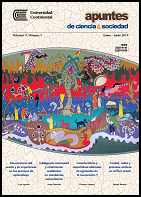Tutoring and social skills in communication learning of high school students in San Juan de Lurigancho, Lima
Abstract
The objective was to determine the influence of tutoring and social skills in the achievement of learning in the communication area of students in the second grade of secondary school of full-time educational institutions in the district of San Juan de Lurigancho, Lima. Quantitative, explanatory and causal study of the hypothetical-deductive method. Cross-sectional or transectional correlational design, not experimental. It was developed in 2016 in seven of the aforementioned educational institutions. The population was made up of 530 students and the sample by 223. The reliability of the variables was by the coefficient of KR-20 and Cronbach’s Alpha. The information processing and analysis was based on the Excel software and the SPSS 20 statistical program. The results show that the tutoring variable influences learning achievement (p=0,000), as well as the social skills variable in the referred achievement (p=0,009), data that confirms the general hypothesis. It is evidenced with p-value <0,05 and 79,3 % (R2 of Cox and Snell). Likewise, tutoring and social skills influence each competence of communication learning achievement: comprehension of oral texts (53,1 %), oral expression (64,8 %), comprehension of written texts (68,8 %), production of written texts (63,1 %) and interaction of literary expressions (64,4 %). It is concluded that tutoring and social skills have a significant influence on learning achievement and their respective competences in the communication area of second grade schoolchildren from the educational institutions studied.
References
Caballo, V. (2007). Manual de evaluación y entrenamiento de las habilidades sociales (7ª ed.). Madrid: Siglo XXI de España Editores.
Cáceres, H. y Olvera, J. (2014). Proceso de tutorías sobre el rendimiento académico, en los departamentos de orientación y bienestar estudiantil de los colegios de la provincia del Azuay (tesis de licenciatura en Psicología Educativa en la especialización de Orientación Profesional). Universidad de Cuenca, Ecuador.
Gómez, S. (2015). Habilidades sociales de los escolares y prevención del conflicto: Programa de mejora del clima escolar. España: Universidad Autónoma Barcelona. Recuperado de https://ddd.uab.cat/pub/tfg/2015/133350/TFG_sgomezserra.pdf
González V. (2002). Orientación educativa-vocacional. Una propuesta metodológica para la elección y desarrollo profesional responsable. Congreso internacional. La Habana.
Hernández, R., Fernández, C. y Baptista, P. (2003). Metodología de la investigación (5ª ed.). México: McGraw-Hill.
Hernández, R., Fernández, C. y Baptista, P. (2014). Metodología de la investigación (6ª ed.). México: McGraw-Hill.
Ministerio de Educación del Perú. (2010). Normas para el desarrollo de las acciones de tutoría y orientación educativa en las Direcciones Regionales de Educación, Unidades de Gestión Educativa Local e instituciones educativas. Resolución Directoral N° 0343-2010-ED. Recuperado de http://www.minedu.gob.pe/normatividad/resoluciones/rd_0343-2010-ed.pdf
Ministerio de Educación del Perú. (2013). Rutas del aprendizaje. ¿Qué y cómo aprenden nuestros estudiantes? VI ciclo. Área Curricular Comunicación (primero y segundo grados de Educación Secundaria).
Rico, P. (2003). La zona de desarrollo próximo. Procedimientos y tareas de aprendizaje. La Habana: Pueblo y Educación.
Rosales, A. (2010). La orientación y tutoría y su influencia en el rendimiento académico de los estudiantes de la institución educativa Sor Ana de los Ángeles, del nivel primaria, Callao, 2007-2008 (tesis de maestría en la especialidad de Orientación Educativa). Universidad Nacional de Educación Enrique Guzmán y Valle (La Cantuta), Chosica, Lima.
Sánchez, H., y Reyes, C. (2015). Metodología y diseños en la investigación científica (5ª ed.). Lima: Business Support Aneth.
Copyright (c) 2020 Apuntes de Ciencia & Sociedad

This work is licensed under a Creative Commons Attribution 4.0 International License.













